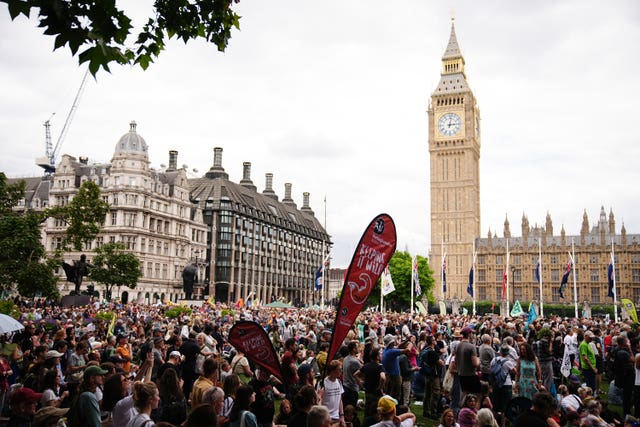Keir Starmer and his Government must make nature one of their top priorities, green groups have urged.
A coalition of environmental campaigners, including the National Trust, WWF, RSPB and Extinction Rebellion, have called on the Prime Minister to address five major challenges to protect the UK’s environment and ecosystems.
These include doubling the nature and climate-friendly farming budget to £6 billion, introducing new rules to make polluters pay for nature and climate recovery and expanding protected areas.
The groups are also calling for the Government to table an Environmental Rights Bill and take climate actions like increasing home energy efficiency, supporting active travel and public transport, and transitioning to renewables.
It comes after the coalition joined forces for the Restore Nature Now march in central London during the election campaign last month.

The protest saw 400 organisations and an estimated 60-80,000 people rally outside Parliament with the backing of celebrities like Dame Judi Dench and Emma Thompson.
Chris Packham, TV broadcaster and environmental campaigner, said the march “wasn’t a one-off event, easy to ignore by politicians, industry and media”.
“This was the start of a new movement who will not stand by while nature is annihilated. We don’t just want our message to be ‘heard’, we want it to be acted on. Now,” he said.
“Our next government needs to hit the ground running in this escalating ecological crisis; ground that is parched from drought, flooded, overgrazed, burnt, saturated with pollutants… alarmingly devoid of life.”

The green groups said they will launch further actions as the new Government settles into power, including a “mass lobby” which aims for thousands of people to travel to Westminster to talk to their MPs, and the first UK Nature Conference.
They warned of the ongoing declines of vulnerable and beloved species like nightingales and puffins while a quarter of UK mammals are at risk of extinction, including water voles, hazel dormice and pine martens.
Tanya Steele, WWF-UK’s chief executive, said: “The new Government has been elected at a time when there is a wave of public support for progress on climate and nature.
“We need new funding, new legislation, and new ambition to restore a thriving natural world for people and wildlife and secure a future of clean water, clean air, healthy food and a stable climate.”
Daze Aghaji, spokesperson for Extinction Rebellion UK, said: “The UK is one of the most nature-depleted countries worldwide and we know that drastic and radical action needs to be taken to halt harm and restore the natural world.
“The only way we can do the full restoration work is by making sure our decision-making structures are fit to address this crisis.
“This is why we need a truly democratic system which mimics the collaborative function of nature – one where everyone has a seat at the decision-making table.”
Beccy Speight, RSPB chief executive, said: “Nature doesn’t have a voice, but we do, and we’ll be continuing to speak up loudly for nature together.
“We still have a crucial window of opportunity to rewrite the story of nature’s decline, and that’s why we urgently need to see the new Government prioritise it. We simply cannot afford to wait any longer.”
The coalition also cited recent YouGov polling, which found that a majority of adults in the UK (57%) say that the environment in the UK is in a bad state with Labour voters far more likely to agree with this at 75% compared to 64% of Liberal Democrat voters and 43% of Conservatives.
Steve Backshall, naturalist and explorer, said: “The UK is an island of nature lovers. Yet the vast majority of people in the UK don’t think our politicians are doing enough to protect our natural world for future generations.
“That’s a major problem, and one that the new Government has an opportunity to turn a fresh page on.”
A Department for Environment, Food and Rural Affairs spokesperson said: “Nature underpins everything. That is why this government is absolutely committed to restoring and protecting nature.
“We will ensure the Environmental Improvement Plan is fit for purpose and focused on delivering our Environment Act targets, improve access to nature and protect our landscapes and wildlife.”













